Radio personalities should be allowed to show more of themselves – and play more than the same 300 to 400 songs over and over, veteran disc jockey Tony Blackburn says.
The Radio Academy invited him to share stories from his long-lasting career, from the offshore radio pirates to public broadcasting establishment, and all in between. About the pros and cons of American format radio: “Radio 2 does everything that some radio stations say you shouldn’t do.”
Entering at Radio Caroline
Tony Blackburn (1943) seems to have an incredible amount of energy. At the age of 70, he’s presenting multiple radio shows a week on several different stations. “Right from the word go, radio has been the thing for me.” His Life In Radio starts at legendary Radio Caroline South in the 1960s. “I saw a documentary to do with pirate radio, which I hadn’t heard. I lived in ‘Pool’ and we didn’t get anything down there at all. The signal wasn’t that strong.” He stumbles upon an advert of Radio Caroline in the local newspaper, finding that they are looking for presenters. As it often happens in radio, he’s hired in an unconventional way:
[audio:http://www.radioiloveit.com/wp-content/uploads/tony-blackburn-radio-academy-2013-01.mp3|titles=Tony Blackburn on how he became DJ for Radio Caroline South]and this is how the young disc jockey sounds on Radio Caroline South:
[audio:http://www.radioiloveit.com/wp-content/uploads/tony-blackburn-radio-academy-2013-02.mp3|titles=An aircheck of Tony Blackburn on Radio Caroline South]
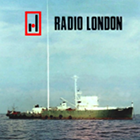 Switching to Big L
Switching to Big L
“I remember going to Radio Caroline on a little tender boat and seeing it for the first time, thinking: how wonderful that is. It’s three miles out and causing the government so many problems – I’d like to be a part of that!” Blackburn later moves to Wonderful Radio London, which is more professional in his view. “It was the first station that brought in Top 40 radio, which I’d heard in America.” He travels to the US to find new inspiration.
Introducing American radio sound
“I sat in a hotel, and listened to American radio – which is quite sad in a way, when you think about it – by myself. I thought it was fabulous and I wanted to bring that to this country. Radio London was the one that did it.” Tony Blackburn is missing great jingles on today’s radio, where many stations use more sweepers (and other speech-based elements) than jingles. To him, those ‘Big L’ IDs are “the most wonderful jingles every made”. He remembers hearing them for the very first time:
[audio:http://www.radioiloveit.com/wp-content/uploads/tony-blackburn-radio-academy-2013-03.mp3|titles=Tony Blackburn on the famous Wonderful Ladio London jingles]
“Talk to that microphone as to a friend”
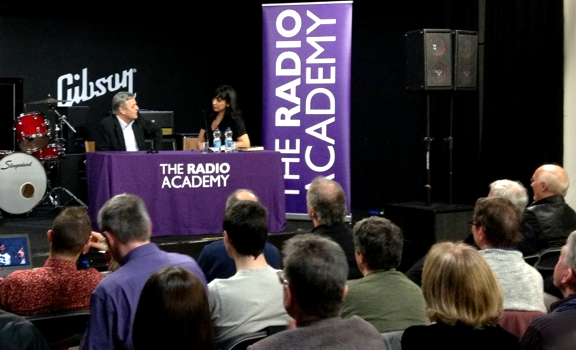
According to UK radio personality Tony Blackburn, here being interviewed by Aasmah Mir, the best deejays are often introverted people who wish to communicate indirectly; using a microphone (photo: The Radio Academy)
Pleading for personality radio
For Pick of the Pops on BBC Radio 2 he has some JAM jingles [from several awesome Z100 packages from the 1980s] re-sung on the original backing tracks. “They just give this exciting feel.” Blackburn doesn’t think that jingles and other classic elements of radio are old-fashioned. “It is called personality; it is called entertainment. I’m not a monkey radio disc jockey, you know? This is what many stations don’t understand anymore. For God’s sake, let broadcasters have a little bit of personality. If you want to hear music, you’ve got an iPad or an iPhone. I want to hear somebody make me laugh or at least stimulate the conversation a bit. Don’t just tell them to play 3 records in a row and do a time check.”
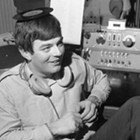 Presenting Radio 1 breakfast show
Presenting Radio 1 breakfast show
Tony Blackburn becomes the first disc jockey to broadcast on BBC Radio 1; the public broadcaster’s answer to the popular offshore stations. Pirate radio [theme of the movie The Boat That Rocked] changed the media landscape quite a bit: “When I went out there, I knew that we would alter the whole of broadcasting.” BBC Radio 1 is launched on September 30, 1967 at 07:00. Millions of people hear him present the very first breakfast show:
[audio:http://www.radioiloveit.com/wp-content/uploads/tony-blackburn-radio-academy-2013-04.mp3|titles=An aircheck of Tony Blackburn opening BBC Radio 1]
Using radio as compensation
He thinks that the best deejays on the radio understand loneliness. “The best presenters that I’ve met are people like Kenny Everett. Kenny was a very introvert sort of person as well. There are two sides: if you’re a deejay that goes out on the stage and over the top, that’s fine. But it’s not necessarily the best deejay for radio. A lot of deejays are very shy people. When I was younger, I was quite shy. You get to a stage in your life when you don’t care quite as much, but when you’re at that stage; yes. And I love radio studios – I mean, talk to that microphone as to a friend.” Blackburn recalls that those years of BBC Radio 1 are remarkable. Due to a lack of real competition, the station rules the airwaves and the deejays become superstars by entertaining 20 million listeners:
[audio:http://www.radioiloveit.com/wp-content/uploads/tony-blackburn-radio-academy-2013-05.mp3|titles=Tony Blackburn on the huge popularity of BBC Radio 1 DJs]
“He should be given a Sony Radio Award”
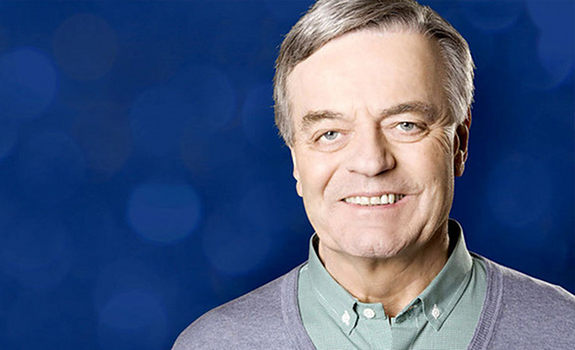
Tony Blackburn, here on a BBC press photo, is a big fan of LBC 97.3 talk radio host Steve Allen (photo: BBC)
Getting on national television
A whole new generation gets to know Tony Blackburn after he wins the ‘jungle-survival’ TV show I’m a Celebrity…Get Me Out of Here! (at the age of 60) in 2002. His wife and mother tried to talk him out of doing it. “They said: you find people slightly annoying, haha. I’m better with people now than I used to. Since I’ve done I’m a Celebrity, funny enough. I believe that if you’re given an opportunity in life and you think you can do it, grab it. I couldn’t bear seeing this show thinking: I could have been a part of that. It was a terrific experience and I loved every moment of it. I fell in love with the rain forest and Nell McAndrew – who looks a bit like Doris Day when she puts a hat on. I promise you: it wasn’t to help my career along, because actually I was on the air 6 days a week anyway.”
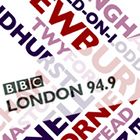 Putting work joy first
Putting work joy first
After his BBC Radio 1 time, he finds employment at BBC London 94.9, Capital Gold and Smooth Radio before returning to 94.9 FM. Today, Blackburn even makes radio on smaller local stations. “I love, love, love being on Radio 2 with Pick of the Pops, but I’ve also been down at BBC Radio Berkshire today, doing more of a chat show. “It doesn’t matter to me what it is, as long as the show is right and the people that I work with are nice as well.”
[audio:http://www.radioiloveit.com/wp-content/uploads/tony-blackburn-radio-academy-2013-06.mp3|titles=A promo introducing Tony Blackburn returning to BBC London 94.9]
Giving credit to colleagues
One of his favorite radio deejays is Steve Wright. “People say that his show hasn’t changed. Why would he want to change it? It’s so successful. I think he’s brilliant.” Tony Blackburn’s favorite radio personality is not a deejay – it’s a presenter of Talk station LBC 97.3 (London’s Best Conversation). “Steve Allen is the best broadcaster in the country. He’s the funniest and so underrated by that station. I don’t know why they put him on at 4 o’clock in the morning. I’d put him on in the afternoon and he’d get a fantastic audience for them. The guy is just brilliant and he should be given a Sony Radio Award.”
“If I was running a radio station
and it wasn’t Radio 2, I’d actually copy it.”
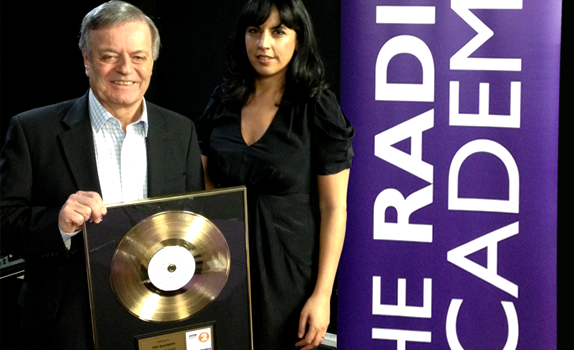
Tony Blackburn, here posing with a golden record besides session host Aasmah Mir, sees BBC Radio 2 as “the icing on the cake” of his broadcasting career, because the format of the station breaks with many established radio programming rules and is very successful anyway (photo: The Radio Academy)
Promoting more music variety
In Blackburn’s opinion, music radio often lacks variety. “I find it very strange that on a lot of commercial radio [stations] they have the same 300 or 400 records over and over and over again – particularly on a gold station. There’s 6 decades of great hits! I’m very lucky [that] on Magic in the North I choose my own music. When I was on Capital Gold, I played Baker Street so many times. It is laziness, in my opinion; laziness. Who said that we have to play the same records over and over again? It’s absolutely stupid.” He says that as much as he adored American format radio in the 1960s, it might have influenced the UK radio industry too much after all.
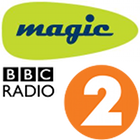 Hopping between multiple stations
Hopping between multiple stations
The radio veteran realizes that he has some strong views, explaining that’s because he still cares about radio a great deal. “I do love it.” Tony Blackburn hopes to go on for quite some time. “I’m working with very nice people, and I’m now enjoying it probably more than I have ever done in my life. I go from radio station to radio station. That way, you don’t get involved in the politics, and can’t get on people’s nerves for too long, haha.”
Coming full circle at Radio 2
Then, more serious again: “I think some people forget how lucky we are to be in this sort of business. It is great. For me, the icing on the cake really was joining Radio 2. When I left Radio 1 it took me 30 years to get back on [national radio]. Blackburn falls in love with the station after meeting program director Lewis Carnie who says: “We don’t care how long a deejay talks, as long as it’s entertaining. And I thought: God, that’s fantastic. Radio 2 does everything that some radio stations say you shouldn’t do – well, it’s successful! If I was running a radio station and it wasn’t Radio 2, I’d actually copy it.”
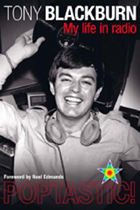 Poptastic!
Poptastic!
My Life In Radio
If you like more radio stories from his long-lasting broadcasting career, and pick up a radio lesson or two, you might enjoy reading Tony Blackburn’s autobiography: Poptastic! My Life In Radio. He’s sharing stories from pirate radio to both public and commercial radio in the UK. We have a special page for books about radio broadcasting like books on radio programming, radio production, and personality radio (including Poptastic! by Tony Blackburn).





Add Your Comment